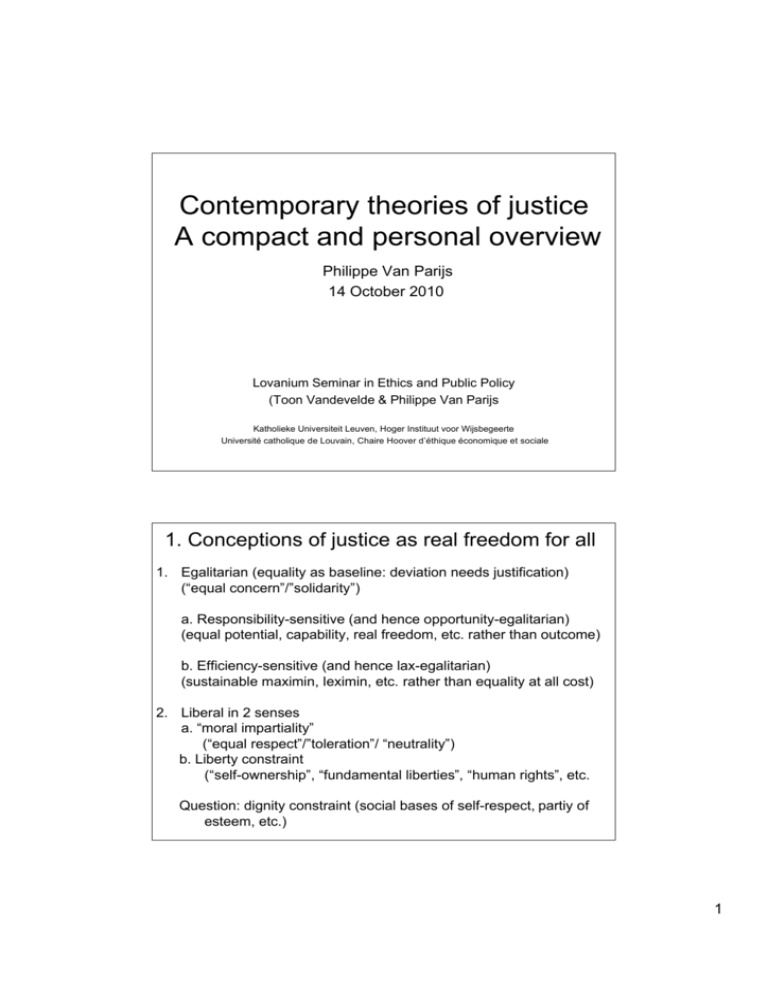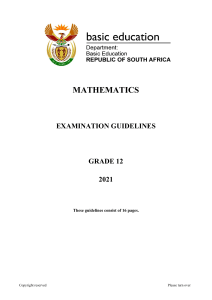Contemporary theories of justice A compact and personal overview
advertisement

Contemporary theories of justice A compact and personal overview Philippe Van Parijs 14 October 2010 Lovanium Seminar in Ethics and Public Policy (Toon Vandevelde & Philippe Van Parijs Katholieke Universiteit Leuven, Hoger Instituut voor Wijsbegeerte Université catholique de Louvain, Chaire Hoover d’éthique économique et sociale 1. Conceptions of justice as real freedom for all 1. Egalitarian (equality as baseline: deviation needs justification) (“equal concern”/”solidarity”) a. Responsibility-sensitive (and hence opportunity-egalitarian) (equal potential, capability, real freedom, etc. rather than outcome) b. Efficiency-sensitive (and hence lax-egalitarian) (sustainable maximin, leximin, etc. rather than equality at all cost) 2. Liberal in 2 senses a. “moral impartiality” (“equal respect”/”toleration”/ “neutrality”) b. Liberty constraint (“self-ownership”, “fundamental liberties”, “human rights”, etc. Question: dignity constraint (social bases of self-respect, partiy of esteem, etc.) 1 Peter Singer 2. Four conceptions left out 1. Utilitarianism: maximization of aggregate welfare Robert Nozick 2. Libertarianism: respect for natural rights of ownership over oneself and external objects Gerald Cohen 3. Marxism: abolition of alienation and/or exploitation Michael Sandel Charles Taylor 4. Communitarianism: pursuit of the common good Michael Walzer 3. Conceptions of justice as real freedom for all A. Equalization of endowments (Dworkin, Varian, Arneson, Ackerman, Sen) B. Maximal expectations for the least fortunate (John Rawls, A Theory of Justice) C. Equalization of achievement across types (John Roemer, Equality of Opportunity) D. Maximal gift for the least indulged (Philippe Van Parijs, Real Freedom for All) 2 A. Equalization of endowments 1. Equal earning power (Hal Varian) 2. Equal opportunity for welfare (Richard Arneson) 6. Equal basic capabilities (Amartya Sen) 5. Undominated diversity (Bruce Ackerman) 3. Equal resources (Ronald Dworkin) 4. Counterfactual insurance for ordinary handicaps (Ronald Dworkin) B. Maximal expectations for the least fortunate John Rawls’s Theory of Justice [1971], as clarified in his Justice as Fairness [2001] 1. Fundamental liberties 2a. Difference principle: maximization of expectations of social and economic advantages for those in the worst social position 2b. Fair Equality of Opportunity: equal access to social positions for given talents 3 C. Equalization across types John Roemer’s Equality of opportunity [1999] inspired by his earlier General Theory of Exploitation and Class [1981] • Types are values of discrete variables out of people’s control (e.g. IQ, place of birth, mother’s education) • Equalities are equalized if one’s type has no impact on one’s expected achievement (e.g. educational success, health state) D. Maximal gift for the least indulged Philippe Van Parijs’s Real Freedom for All [1995] • Even jobs are gifts • The value of a gift is its opportunity cost • Maximize the value of what is received by those who receive least • For this purpose, sustainably maximize a universal basic income Bibliography Ackerman Bruce A. [1980], Social Justice in the Liberal State, New Haven et Londres, Yale University Press. Arneson Richard J. [1989], “ Equality and Equal Opportunity for Welfare ”, Philosophical Studies, vol. 56, p. 77–93. Cohen Gerald A. [1999], If You Are An Egalitarian, How Come You Are So Rich ?, Cambridge, Harvard University Press. Dworkin Ronald [2000], Sovereign Virtue. Cambridge (Mass): Harvard UP. Freeman Samuel [2002] (ed.), The Cambridge Companion to John Rawls, New York, Cambridge University Press. Nozick Robert [1974], Anarchy, State and Utopia, Oxford, Blackwell. Trad. franç. : Anarchie, Etat et utopie, PUF, 1988. Rawls John [1971], A Theory of Justice, Cambridge (MA), Harvard University Press, 1972. Trad. franç. : Théorie de la justice, Seuil, 1987. Roemer John E. [1998], Equality of Opportunity, Cambridge (MA), Harvard University Press. Sandel Michael [1982], Liberalism and the Limits of Justice, Cambridge, Cambridge University Press. Sen Amartya [1985]. Commodities and Capabilities, Amsterdam, North–Holland. Sen Amartya [2009], The Idea of Justice, London, Penguin & Cambridge, Mass: Harvard UP.. Steiner Hillel [1994], An Essay on Rights, Oxford, Blackwell. Taylor Charles [1992], The Malaise of Modernity, Concord (Ontario). Van Parijs Philippe [1995], Real Freedom for All. What (if anything) Can Justify Capitalism ?, Oxford, Oxford University Press. Van Parijs, Philippe. 2009. « Egalitarian justice, left libertarianism and the market », in The Anatomy of Justice. Themes from the Political Philosophy of Hillel Steiner (I. Carter, S. de Wijze & M. Kramer eds.), London: Routledge, 145-162. Walzer Michael [1983], Spheres of Justice, New York, Basic Books. Trad. franç. : Les Sphères de la justice, Seuil, 1995. 4

